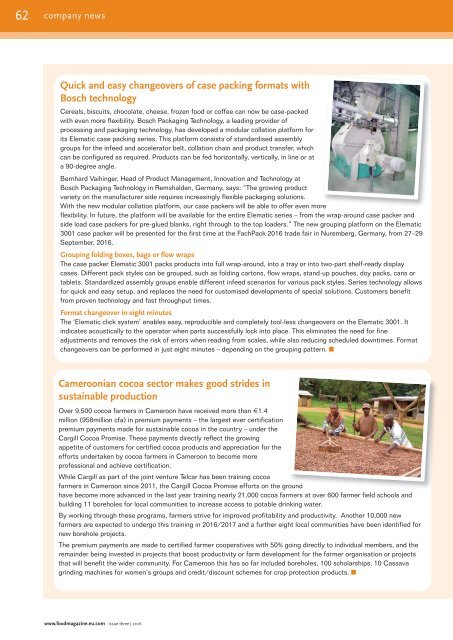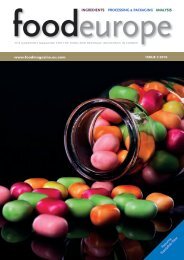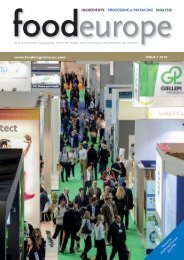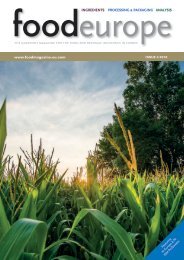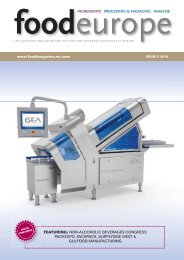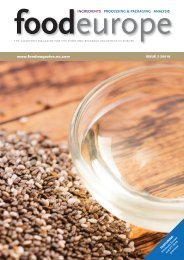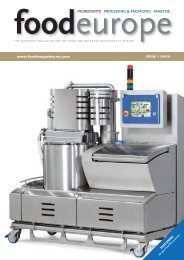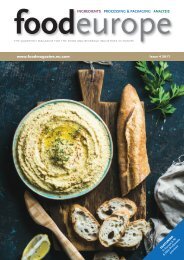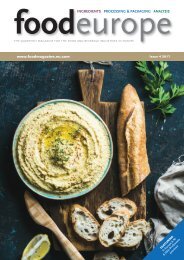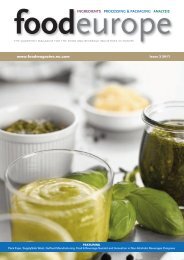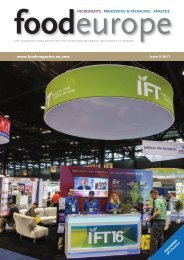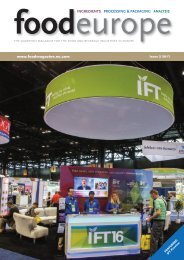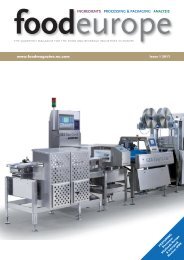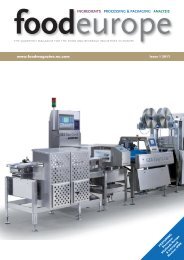Issue 3 2016
Create successful ePaper yourself
Turn your PDF publications into a flip-book with our unique Google optimized e-Paper software.
62 company news<br />
Quick and easy changeovers of case packing formats with<br />
Bosch technology<br />
Cereals, biscuits, chocolate, cheese, frozen food or coffee can now be case-packed<br />
with even more flexibility. Bosch Packaging Technology, a leading provider of<br />
processing and packaging technology, has developed a modular collation platform for<br />
its Elematic case packing series. This platform consists of standardised assembly<br />
groups for the infeed and accelerator belt, collation chain and product transfer, which<br />
can be configured as required. Products can be fed horizontally, vertically, in line or at<br />
a 90-degree angle.<br />
Bernhard Vaihinger, Head of Product Management, Innovation and Technology at<br />
Bosch Packaging Technology in Remshalden, Germany, says: “The growing product<br />
variety on the manufacturer side requires increasingly flexible packaging solutions.<br />
With the new modular collation platform, our case packers will be able to offer even more<br />
flexibility. In future, the platform will be available for the entire Elematic series – from the wrap-around case packer and<br />
side load case packers for pre-glued blanks, right through to the top loaders.” The new grouping platform on the Elematic<br />
3001 case packer will be presented for the first time at the FachPack <strong>2016</strong> trade fair in Nuremberg, Germany, from 27–29<br />
September, <strong>2016</strong>.<br />
Grouping folding boxes, bags or flow wraps<br />
The case packer Elematic 3001 packs products into full wrap-around, into a tray or into two-part shelf-ready display<br />
cases. Different pack styles can be grouped, such as folding cartons, flow wraps, stand-up pouches, doy packs, cans or<br />
tablets. Standardized assembly groups enable different infeed scenarios for various pack styles. Series technology allows<br />
for quick and easy setup, and replaces the need for customised developments of special solutions. Customers benefit<br />
from proven technology and fast throughput times.<br />
Format changeover in eight minutes<br />
The ‘Elematic click system’ enables easy, reproducible and completely tool-less changeovers on the Elematic 3001. It<br />
indicates acoustically to the operator when parts successfully lock into place. This eliminates the need for fine<br />
adjustments and removes the risk of errors when reading from scales, while also reducing scheduled downtimes. Format<br />
changeovers can be performed in just eight minutes – depending on the grouping pattern. n<br />
Cameroonian cocoa sector makes good strides in<br />
sustainable production<br />
Over 9,500 cocoa farmers in Cameroon have received more than €1.4<br />
million (958million cfa) in premium payments – the largest ever certification<br />
premium payments made for sustainable cocoa in the country – under the<br />
Cargill Cocoa Promise. These payments directly reflect the growing<br />
appetite of customers for certified cocoa products and appreciation for the<br />
efforts undertaken by cocoa farmers in Cameroon to become more<br />
professional and achieve certification.<br />
While Cargill as part of the joint venture Telcar has been training cocoa<br />
farmers in Cameroon since 2011, the Cargill Cocoa Promise efforts on the ground<br />
have become more advanced in the last year training nearly 21,000 cocoa farmers at over 600 farmer field schools and<br />
building 11 boreholes for local communities to increase access to potable drinking water.<br />
By working through these programs, farmers strive for improved profitability and productivity. Another 10,000 new<br />
farmers are expected to undergo this training in <strong>2016</strong>/2017 and a further eight local communities have been identified for<br />
new borehole projects.<br />
The premium payments are made to certified farmer cooperatives with 50% going directly to individual members, and the<br />
remainder being invested in projects that boost productivity or farm development for the farmer organisation or projects<br />
that will benefit the wider community. For Cameroon this has so far included boreholes, 100 scholarships, 10 Cassava<br />
grinding machines for women’s groups and credit/discount schemes for crop protection products. n<br />
www.foodmagazine.eu.com issue three | <strong>2016</strong>


